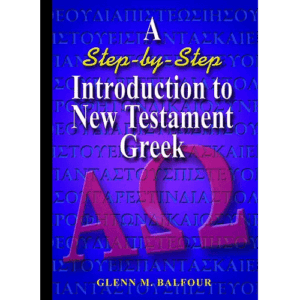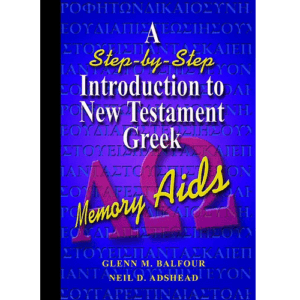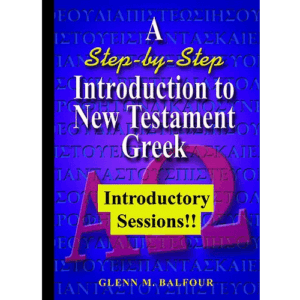Read the Bible as It Was Written
Discover the depth of Scripture through Biblical Hebrew and New Testament Greek — unlocking meaning, nuance, and spiritual insight found only in the original languages.
G.M. BALFOUR PUBLICATIONS
-
A STEP-BY-STEP INTRODUCTION TO NEW TESTAMENT GREEK
£20.99 -
A STEP-BY-STEP INTRODUCTION TO NEW TESTAMENT GREEK: MEMORY AIDS
£20.99 -
A STEP-BY-STEP INTRODUCTION TO NEW TESTAMENT GREEK: INTRODUCTORY SESSIONS
£1.00 -
A STEP-BY-STEP INTRODUCTION TO BIBLICAL HEBREW
£20.99 -
A STEP-BY-STEP INTRODUCTION TO BIBLICAL HEBREW: TABLES
£1.00

About the author
Glenn Balfour has been involved in both Christian Ministry and higher education throughout his adult life. He completed his degree studies in 1995 (B.D – King’s College, London; M.Th., Ph.D. – Nottingham University), and since then has served at the Assemblies of God Bible College (Mattersey Hall / Missio Dei).
Glenn’s teaching specialisms are New Testament studies (especially John’s Gospel) and the two main biblical languages. He has developed a range of teaching resources in both New Testament Greek and Biblical Hebrew.
He is married to Caroline. They have four grown-up children (Rebecca, Nathan, Daniel and Hannah) and six grandchildren (Jemima, Grace, Lydia, Hope, Emilia and Jonah).
Three reasons why you should begin learning today

Why Study the Biblical Languages?
Biblical Hebrew and New Testament Greek provide a direct bridge to the original biblical texts, offering a deeper and more authentic understanding of Scripture. Studying these ancient languages reveals nuances, wordplays, and theological insights often lost in translation. Whether for personal study, ministry, or academic pursuit, learning the biblical languages opens up a richer connection to the Bible’s original message and meaning. It’s a journey that brings the text to life with clarity and depth.

The Beauty of Biblical Hebrew
Biblical Hebrew, the language of the Old Testament, reflects the worldview, worship, and history of the ancient Hebrew people. Its poetic structure, vivid imagery, and compact vocabulary often express profound meaning with elegant simplicity. Words are rich in symbolism, often layered with spiritual significance. By learning Hebrew, you engage with Scripture as its first audience did—unlocking cultural insights, literary artistry, and the heart of the Hebrew faith tradition.

The Precision of New Testament Greek
New Testament Greek is a language of structure and precision, uniquely suited to express complex theological ideas. Its grammar allows for subtle distinctions in meaning, and its vocabulary can convey powerful truths with clarity. The Greek of the New Testament often reveals connections between passages, themes, and doctrines that English translations may blur. Studying Greek gives you the tools to interpret the New Testament with greater accuracy and depth—enriching both faith and understanding.









